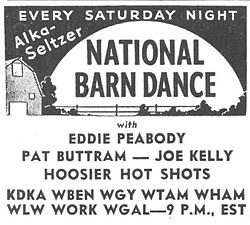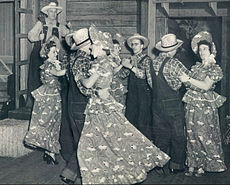- National Barn Dance
-
National Barn Dance, broadcast by WLS-AM in Chicago, Illinois starting in 1924, was one of the first American country music radio programs and a direct precursor of the Grand Ole Opry. [1]
It also set the stage for other similar programs, in part because the clear-channel signal of WLS could be received throughout most of the Midwest and even beyond in the late evening and nighttime hours, making much of the United States (and Canada) a potential audience. The program was well-received and thus widely imitated.
Contents
History
National Barn Dance was founded by broadcaster George D. Hay.[2] It first aired on WLS on April 19, 1924 and originated from the Eighth Street Theater starting in 1931. The show was picked up by NBC Radio in 1933,[2] and in 1946 it switched to the ABC Radio network and aired until 1952 on Saturday nights from 6:30 p.m. to midnight.
The show regularly featured Gene Autry, Eddie Dean, Lulu Belle and Scotty, Pat Buttram, George Gobel, The Williams Brothers (featuring future crooner Andy Williams), The DeZurik Sisters and the Hoosier Hot Shots. Other guests included Smiley Burnette, Eddie Peabody and Joe Kelly, best remembered today as the host and moderator of NBC's Quiz Kids. The announcer was Jack Holden and it was once sponsored by Alka-Seltzer.
ABC made two moves that ultimately led to National Barn Dance's slow demise. The first was the cancellation of the network broadcast in 1952. After a few years, audiences finally began to wane, and the program ceased live performances after 1957. The show continued to air on WLS, however, until 1959 when ABC bought the station and changed the format to Top 40 rock and roll, canceling National Barn Dance outright. The show, then a shadow of its former self, moved to Chicago's WGN-AM until it finally left the air in 1968.
Chronology
- 1924–33: WLS-AM
- 1925–28: Two separate versions, WLS-AM (National Barn Dance) and WSM-AM (WSM Barn Dance); the latter became the Grand Ole Opry in 1928
- 1933–46: WLS-AM, carried by NBC Radio
- 1946–52: WLS-AM, carried by ABC Radio
- 1952–60: WLS-AM
- 1960–68: WGN-AM
Performers
- Herb and Kay Adams
- Rex Allen
- Arkie the Arkansas Woodchopper
- Bob Atcher
- Jimmy Atkins
- Gene Autry
- Red Blanchard
- Johnny Bond
- Skeeter Bonn
- Bonnie Blue Eyes
- Phyllis Brown
- Smiley Burnette
- Pat Buttram
- Carl and Hardy
- Jenny Lou Carson
- Uncle Tom Corwin
- Carl Cotner
- Hugh Cross
- Hal Culwer
- Cumberland Ridge Runners
- Eddie Dean
- Mary DeZurik
- The Dinning Sisters
- Uncle Ezra
- Sonny Fleming
- Eva Overstake Foley
- Red Foley
- Four Hired Hands
- Verne Fiedler
- Gene and Glenn
- Little Genevieve
- George Gobel
- Dolly Good
- Milly Good
- Jimmy Gross
- Bill Haley
- Billy Haley
- Dolph Hewitt
- The Hilltoppers
- Salty Holmes
- Homer and Jethro
- Hoosier Hot Shots
- Hoosier Sod Busters
- Dock Hopkins
- Ken Houchins
- Chick Hurt
- Don Jacks
- Jimmie James
- Eileen Jensen
- Helen Jensen
- Pete Kaye
- Joe Kelly
- Chuck Kerner
- Frank Kettering
- Bradley Kincaid
- Lou Klatt
- Augie Klein
- Ray Klein
- John Lair
- Lily May Ledford
- Bonnie Linder
- Connie Linder
- Shorty Long
- Lulu Belle and Scotty
- Mac and Bob
- Bill McCluskey
- Pruth McFarlin
- Clayton McMichen
- Lilly Mae
- Joe Maphis
- Maple City Quartet
- Sleepy Marlin
- Pokey Martin
- Fritz Meissner
- Woody Mercer
- Curley Miller
- Bill Monroe
- Charlie Monroe
- Patsy Montana
- Wally Moore
- Ted Morse
- Ted Moss
- Gerald Myers
- Bill O'Connor
- Hal O'Halloran
- Ole Olson
- Jimmy Osborne
- Evelyn Overstake
- Lucille Overstake
- Tony Pacione
- Chubby Parker
- Linda Parker
- Pat Patterson
- Ben Pi-gotti
- Rocky Porter
- Prairie Ramblers
- Lou Prohut
- Andy Reynolds
- Al Rice
- Jerry Richards
- Buddy Ross
- Gene Ruppe
- Sage Riders
- Bob Shaffer
- John Stokes
- Tiny Stokes
- Capt. Stubby and Buccaneers
- Sunshine Sue
- Tom Tanner
- Jack Taylor
- Cousin Tilford
- Rube Tronson
- Al Vlodek
- Otto Ward
- Ozzie Waters
- Don White
- Colleen Wilson
- Don Wilson
- Donna Wilson
- Grace Wilson
- Winnie, Lou, and Sally
- George Workman
- Sam Workman
Film and TV
A fictionalized account of the show's origins, The National Barn Dance (1944), was filmed by director Hugh Bennett from a screenplay by Hal Fimberg and Lee Loeb. The film starred Jean Heather, Charles Quigley, Robert Benchley, Mabel Paige and Charles Dingle. Pat Buttram and Joe Kelly appeared as themselves.
ABC Barn Dance, a filmed TV series featuring some of the radio performers, was telecast on ABC from February 21–November 14, 1949. Hosted by Jack Stillwell and Hal O'Halloran, the 30-minute musical variety format presented a mix of folk music with country and Western tunes.
Offshoots
In 1925, prior to network radio or syndication, Hay brought his Barn Dance concept to Nashville, Tennessee. The result was a show called the WSM Barn Dance. It became so popular that on December 10, 1927, Hay renamed it the Grand Ole Opry. WSM became one of the first NBC affiliates in 1927, and the Opry is still on the air today.
A second program was launched in the 1930s by National Barn Dance's then-president John Lair in Renfro Valley, Kentucky; the Renfro Valley Barn Dance still takes place weekly but is no longer aired on radio (although a sister program, the Renfro Valley Gatherin', does still air weekly on Sunday mornings).
References
- ^ "The Story of the National Barn Dance (PBS)". 22 August 2011. http://www.pbs.org/programs/hayloft-gang/. Retrieved 22 August 2011.
- ^ a b Young, William H. and Young, Nancy K. (2007). The Great Depression in America, p. 345. Greenwood Publishing Group, Inc.
Listen to
External links
Categories:- 1920s American radio programs
- 1930s American radio programs
- 1940s American radio programs
- 1950s American radio programs
- American country music radio programs
- Radio in Chicago, Illinois
- 1924–33: WLS-AM
Wikimedia Foundation. 2010.


